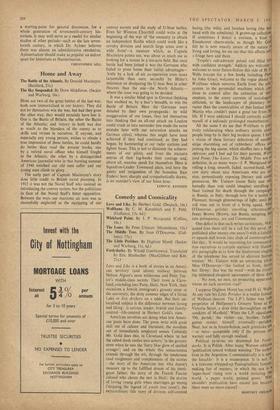Home and Away
The Sky Suspended. By Drew Middleton. (Secker and Warburg, 16s.)
HERE are two of the great battles of the last war, both now immortalised in our history. They did not by themselves win the war, but had they gone the other way, they would certainly have lost it. One is the Battle of Britain, the other the Battle of the Atlantic; and victory in both was due av much to the blunders of the enemy as to skills and virtues in ourselves. If anyone, and especially any young person, wishes to obtain a true impression of these battles, he could hardly do better than read the present books, one by a retired naval officer who himself fought in the Atlantic, the other by a distinguished American journalist who in that burning summer of 1940 watched our old men suffer and our young men climb to glory.
The early part of Captain Macintyre's story does little credit to British naval planning. In 1917 it was not the Naval Staff who insisted on introducing the convoy system, but the politicians in face of the Naval Staff's bitter opposition. Between the wars our maritime air arm was as shamefully neglected as the equipping of our convoy escorts and the study of U-boat tactics. Even Sir Winston Churchill could write at the beginning of the war of 'the necessity to obtain an independent flotilla which could work like a cavalry division and search large areas over a wide front'—a measure which, as Captain Macintyre points out, was about as much use as looking for a mouse in a ten-acre field. But once battle had been joined it was the Germans who failed to press home their initial advantages- irstly by a lack of air co-operation even more la,nentable than ours, secondly by Hitler's insistence on dissipating the U-boat fleet in other theatres than the one—the North Atlantic— where the issue was going to be decided.
It was a similar blind spot in German thinking that enabled us, by a hair's breadth, to win the Battle of Britain. Here the Germans were deluded by their own propaganda : by wild exaggeration of our losses, they led themselves into thinking that an all-out attack on London could crush us into surrender (we made the same mistake later with our saturation attacks on German cities), whereas this might have been achieved if they had continued, as they had begun, by hammering at our radar stations and fighter bases. This is not to diminish the achieve- ments of our pilots; and from the staccato entries of their log-books their courage and, above all, stamina speak for themselves. Here is Squadron-Leader Townsend plain, and here the gaiety and resignation of the homeless East Enders; here, sharply and sympathetically drawn, is an outsider's view of our finest hour.
LUDOVIC KENNEDY






































 Previous page
Previous page